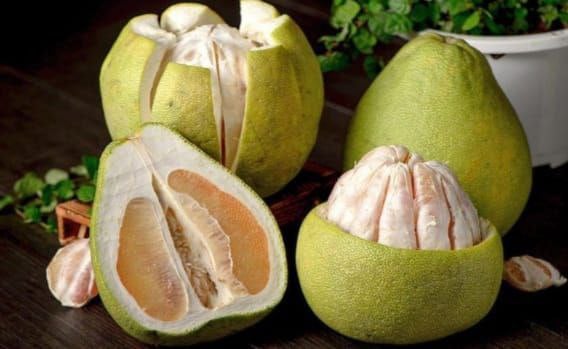Pomelo, the fruit of the pomelo or pomelo or the large lemon or the sandy is a type of lemon, but its shape is a little bit pear-shaped, its peel is thick, its color is green or faint yellow, and its flesh on the surface can remain yellow or green or sometimes pink, and its taste is sweet but for hours it remains in it a sting, which is Close to the taste of grapefruit, but the pomelo is sweeter, and its size is cantaloupe or larger.
The pomelo is popular in many regions such as: China, Japan, Thailand, Malaysia, the Republic of the Fiji Islands, and parts of Southeast Asia.
First: the benefits of pomelo fruit:
It is rich in vitamin C, which is a powerful antioxidant and immune stimulant, which helps reduce the risk of cell damage.
It is rich in dietary fiber, which is a food source for beneficial bacteria in the intestines.
It is rich in insoluble fiber that prevents constipation.
It is also rich in antioxidants, which help prevent free radical damage, which causes health problems and chronic diseases when they accumulate in the body at high levels.
The oils in its peel also have anti-bacterial and anti-fungal properties.
These oils also reduce the production of melanin in the skin, and help prevent discoloration of the skin.... But take care of these essential oils that are very concentrated, so you can't take them, and you should dilute them with a carrier oil before you put them on your skin.
The pomelo itself is generally beneficial for the skin and is anti-aging, because it is rich in antioxidants and vitamin C.
Beneficial for hair health and growth, because it contains vitamins A, C, B and zinc. It also treats dandruff because it contains a high percentage of water and vitamin C.
- It is also useful for dieting, because the protein and dietary fibers in it give you a feeling of satiety for a long time.
- It can reduce the risk of cancer, and promote heart health by lowering cholesterol and triglyceride levels, but these are still preliminary studies that used only animals.
Second: Damage to pomelo fruit:
Allergies to some people, which appear in the form of redness, itching, sores in the mouth and swelling, rashes, dryness and peeling of the skin, or swelling in the throat.
Disturbances of the digestive system such as: bloating, diarrhea, or abdominal pain.
It also has effects on the respiratory system, such as: runny nose, stuffy nose, sneezing, and wheezing.
For people who are allergic to citrus, keep it away.
- If someone suffers from kidney and liver diseases, he should stay away from him, too, because the pomelo contains a high percentage of potassium and vitamin C.
Also, people who suffer from high acidity, and problems with the mucous membranes of the stomach and duodenum, because it contains a high percentage of acids, and the symptoms that come with reflux esophagus and heartburn may increase with it.
It lowers blood pressure significantly.
Unfortunately, there are not enough studies on the side effects of pomelo if I take it with medications, and that's why the doctors at Harvard University think that they are the same as the side effects that happen when someone takes medicines with grapefruit, especially medicines that are used to treat high cholesterol (and these medicines and side effects we talked about in A special post about grapefruit, we will post the link to it in the comments below, God willing), and that is why it is better that you do not eat and do not drink pomelo if you are taking any kind of medication or nutritional supplement.
- It also has a rare but very serious side effect, which is anaphylactic shock, the main symptoms of which are: difficulty breathing, loss of consciousness, redness of the face and neck, nausea, vomiting, diarrhea, a sharp drop in blood pressure levels, swelling of the mouth and throat, and change in heart rate. Either an increase in the number of heartbeats or a decrease from the normal level. In this case, the person must go very quickly to the medical emergency and be treated immediately.












0 Comments